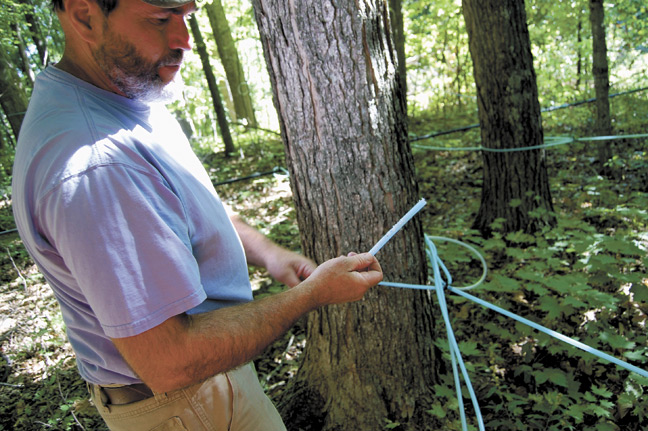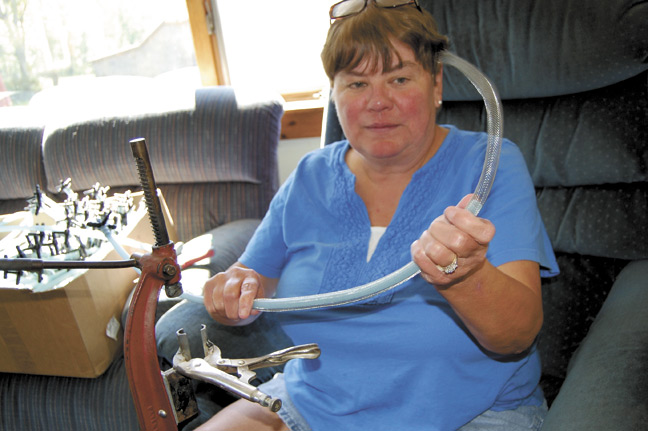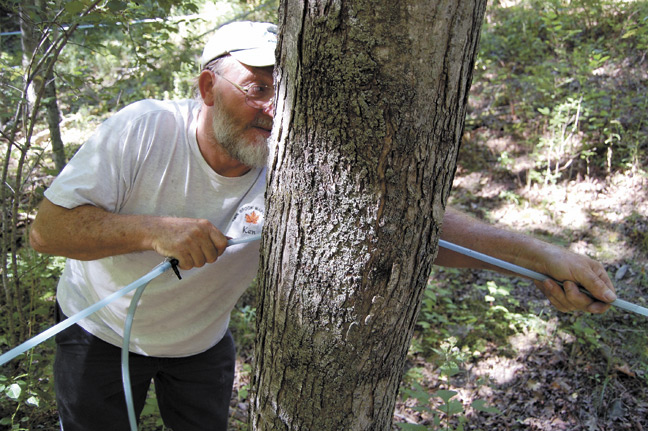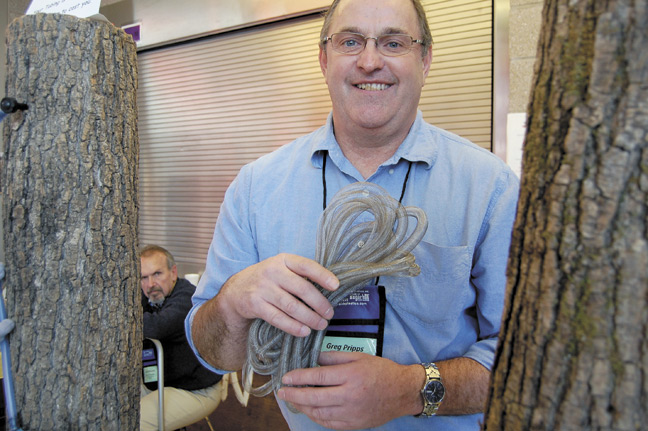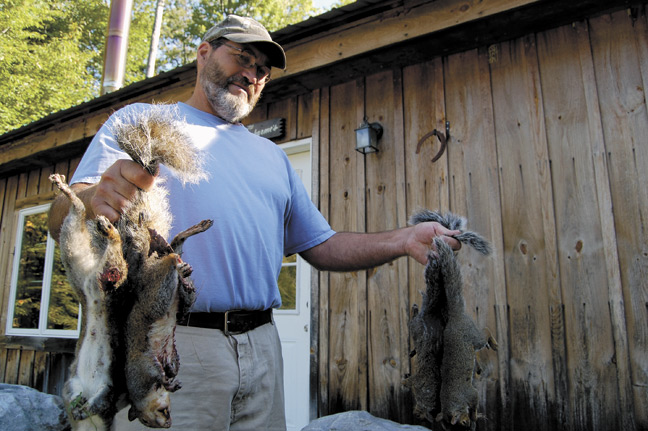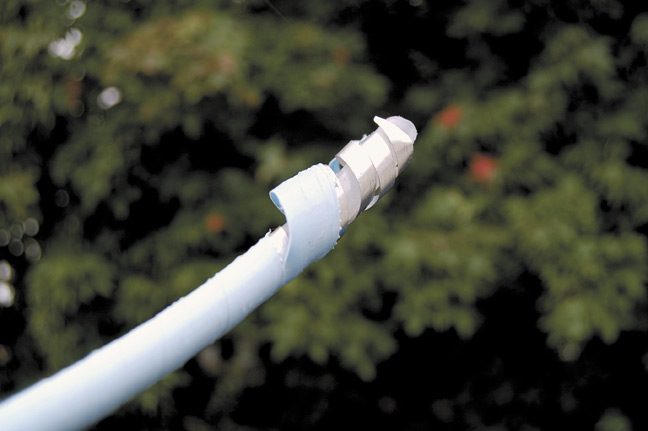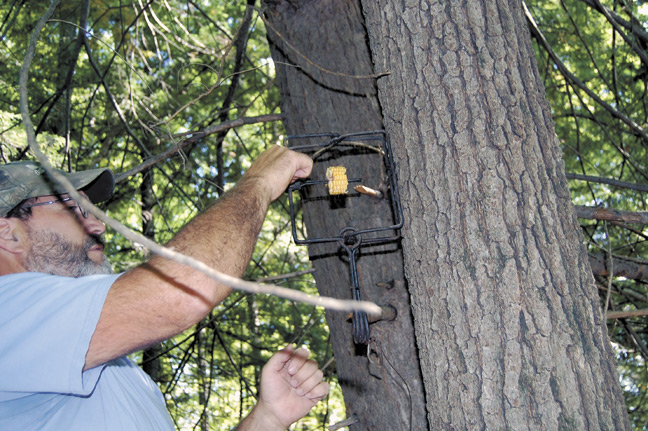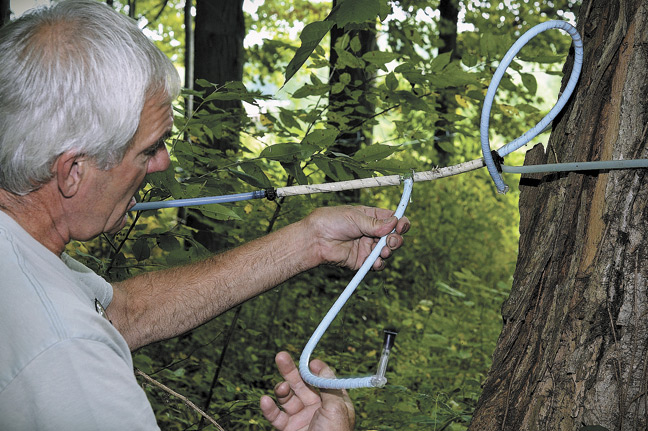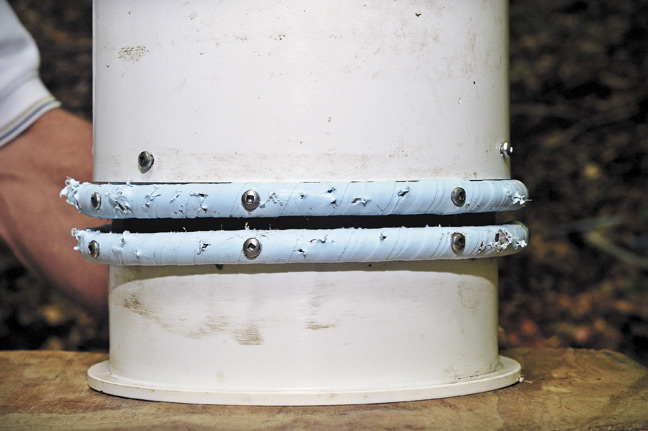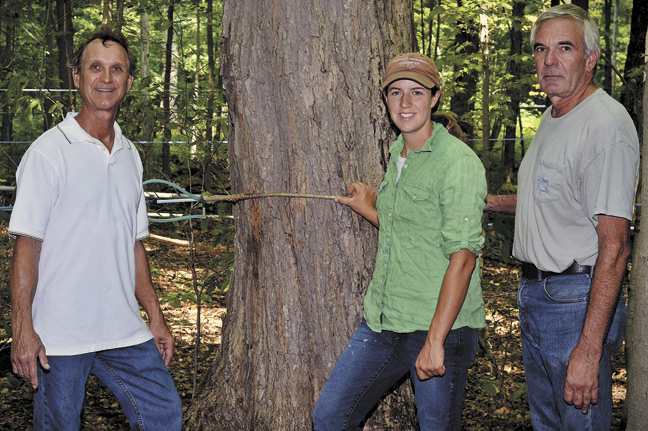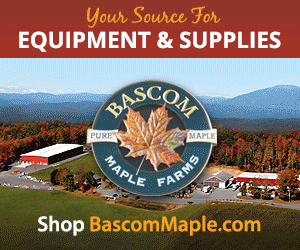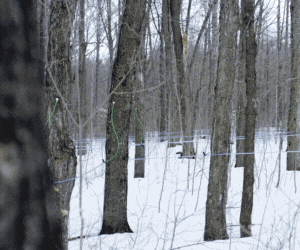Tapping & Tubing
Man vs. Squirrel
Sugarmakers, inventors wage war on destructive rodents
By PETER GREGG |
-

sugarmakers, squirrel, gray squirrel, red squirrel, chewing, tubing, fittings, spouts, tap, operation, woods, maple, sap, rodents
SALEM, N.Y. — The arch enemy of sugarmakers is the squirrel.
More than maybe any other force of nature—a bad season, a bad wind, fallen branches—it’s the hordes of gray and red squirrels that cause the most costly damage in the woods, chewing up tubing, fittings and spouts.
Brian Ducharme, a veteran sugarmaker from Salem, N.Y. has waged a one-man war against the critters, and appears to be winning. But it's taken two years of constant vigilance, a keen shot with the .22 and now a year-round trapping campaign.
“Nobody has had it as bad as me with the squirrels,” Ducharme said during a tour of his woods for The Maple News.
“I thought it was going to stop me from sugaring,” he said.
Ducharme has lost entire sections of woods to squirrels, twice. The critters chewed up everything in a particular 2,000-tap section. Lines, saddles chewed right off, you name it. Even black plastic mainlines. Everything.
“I had this one whole section I had to take down and put up brand new lines. No sap had gone through it or anything and within two days it was all chewed up again,” he said.
Another sugarmaker, Ken Saunders of Rupert, Vt. has also experienced tremendous problems keeping squirrels away from his 20,000-tap operation.
“I had it so bad two years ago that I figure I lost more than $25,000 worth of tubing,” he said during a recent tour for The Maple News.
It’s a common refrain from sugarmakers. At virtually any trade show or sugarmaker gathering, producers across the Maple Belt swap horror stories of lost tubing and lost production from squirrels. Few lateral lines are free of splices. The hiss of vacuum leaks are as natural a sound in the woods during the season as howls of frustration from the sugarmakers who find the bite holes.
Walking the lines during sugaring season—protecting high vacuum that can be lost from just one bite—is routine maintenance for any serious sugarmaker. Who knows how much extra labor and expense is caused by squirrels. The dollars lost are impossible to calculate.
Teething rodents
Dr. Tim Perkins, the director of the University of Vermont Proctor Maple Research Center in Underhill Center, Vt. says he can’t fully explain why squirrels like tubing so much.
“I’ve heard all sorts of things, mostly having to do with their taste for salt or desire to get to any liquid they can see inside the tubing,” he said during an interview with The Maple News.
“Squirrels are rodents. Unlike many animals, rodents have teeth that continue to grow throughout their lives, which requires them to gnaw on things to keep their teeth from overgrowing and to keep them sharp,” Perkins said.
Even at Proctor’s sugarbush, which is monitored by a team of researchers daily and year-round, squirrels have done their handiwork.
“A few years ago we had a squirrel in one section of our woods clip every stubby off the droplines, take a few bites from each, and them stash them in piles like they were nuts or acorns,” Perkins said.
“We’ve also had them chew up hundreds of feet of tubing. The problem used to be worse many years ago when we were using chlorine bleach to wash tubing….we were essentially training the squirrels to like the taste. Now that we no longer clean with bleach our squirrel problem is much less, and far more random.”
Squirrels aren’t the only wildlife that chew tubing.
Proctor has a collection of tubing pieces and fittings on display that have been chewed upon by all sorts of things…coyotes, deer, woodpeckers, insects. Bear have been known to eat tubing as well.
But for Ducharme, it’s the squirrels, grey ones in particular, that have been the biggest menace. And he has decided to fight back.
After getting clearance from the state environmental department to “shoot as many squirrels you want” he started to do just that. Ducharme made it a daily routine to go into his woods and protect his investment with his rifle.
“I had to get serious about it,” he said.
He shot upwards of 300 squirrels over the course of a few months.
Still the critters kept coming back.
So Ducharme tried another method. Trapping.
“Shooting them all wont do it, you gotta trap,” he said.
A lifelong and expert trapper, Ducharme has set traps for the squirrels throughout his woods, especially in a section that is heavy in Hickory trees, which squirrels love because of a taste for Hickory nuts, he says.
Ducharme sets his traps at the state-regulated height of five feet. And his methods have killed hundreds of more squirrels and has been effective, cutting his damage significantly down.
But it is not for everyone.
“I went crazy setting traps and I ended up getting the population down to where it was fine,” he said. “It took a lot of time and effort. You got to want it bad.”
Products on the market
For the sugarmaker who does not have the time or expertise (or the stomach) for shooting or trapping squirrels there are two innovative products recently introduced to the market to protect the woods from critters.
Squirrel Guard, invented and marketed by Greg Pripps, a sugarmaker from Butternut, Wisc. is a braided stainless steel sheath that covers tubing and droplines.
Pripps said the product, which flares out at the ends allowing it to cover fittings and spouts, has successfully repelled squirrels in his own sugarbush during years of testing.
“I tell folks you use it only on the tubing you want to keep,” he quipped.
Pripps says that it repels most other critters as well.
One big customer of the product is Saunders, the sugarmaker in Rupert, Vt. He and his wife Pam have already made 2,500 new droplines wrapped in Pripps’ Squirrel Guard mesh and are hopeful that it will do the trick.
“We are willing to try anything at this point,” Saunders said.
‘No one likes ... aluminum’
Meanwhile, another new product has been launched to help in the war.
Sugarbush Tubing, a new company out of Willoughby, Ohio, has come out with a product called Spiral Wrap Tubing that has an outer shield of aluminum wrapped around conventional 5/16 polyethylene tubing. Then it is wrapped again in a heat-shrunk UV-protected outer wrap.
It’s inventor, Scott Boncha of Chardon, Ohio has also extensively field tested his product with a neighboring sugarmaker, Jeff Burr, of Burton, Ohio, by purposely attracting squirrels to the tubing using squirrel feeders.
The squirrels were thwarted.
“They cant bite through it,” Boncha said of his product.
“The testing I have done is pretty extreme,” he said. “They chewed and chewed on this. As soon as their teeth hits the stuff, one bite and they’re gone. No one likes to chew through aluminum.”
Both Pripps and Boncha say that investing in their products make good economic sense for the producer since they will not have to make an investment in a whole new pipeline system destroyed by rodents.















